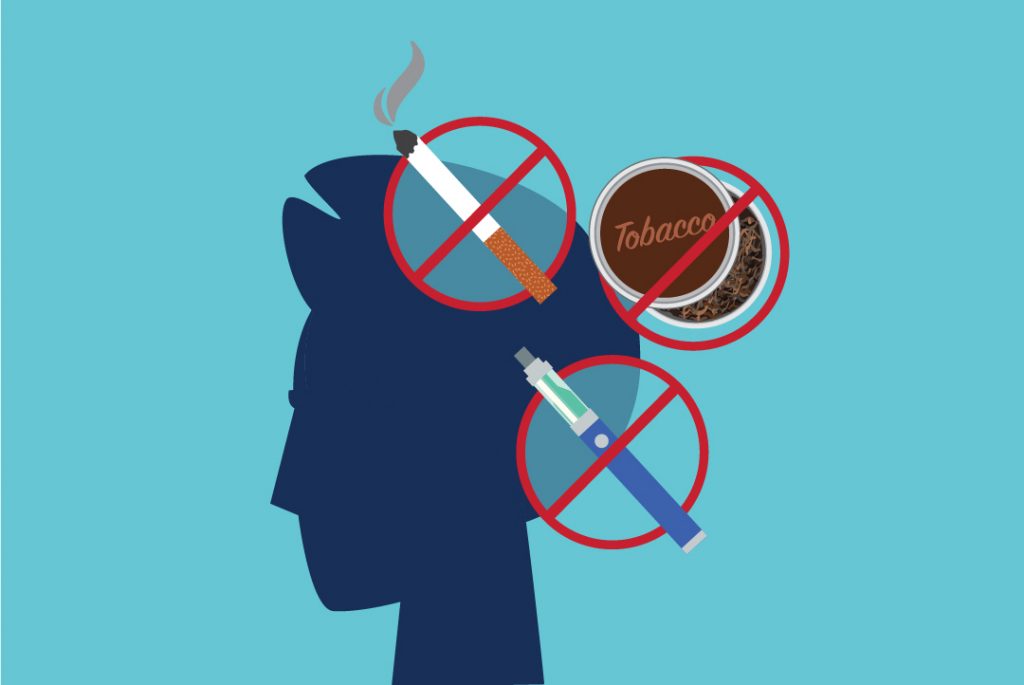LEARN MORE
FEBRUARY 2024
Can quitting nicotine help your mental health?
“It helps me relax.” “It calms me down.” “It gives me energy.” “It helps me concentrate.” This is what nicotine can do, according to some users. Thinking this way can make giving up nicotine even harder, since you may worry that your mental health will suffer if you quit. But recent studies show the opposite is true: Quitting nicotine may improve your mental health.
Looking for more? Find other articles below

How nicotine affects your mood, short-term
Nicotine, an active ingredient in tobacco and e-cigarettes, can briefly improve your mood. Within minutes of inhaling cigarette smoke, vape mist or using chewing tobacco, nicotine causes the release of dopamine, a neurotransmitter associated with positive feelings. Nicotine may also trigger the release of adrenaline, which can give you a surge of energy or focus.
How nicotine affects your mood, long-term
The positive effects of nicotine are short-lived. When nicotine levels drop, you may feel irritable, anxious and restless. Smoke another cigarette or take another chew, and these feelings go away. People perceive this decrease in distress as a benefit of using nicotine products as opposed to what is truly happening — that the distress is a symptom of nicotine withdrawal. This cycle of positive and negative symptoms helps drive nicotine addiction.
“Smokers often believe that cigarettes are the crutch they need when they feel low, but there is good reason to think that smoking is actually making them feel worse,” says Dr. Gemma Taylor, an epidemiologist and behavioral scientist at the University of Bath.
Mental health effects of quitting
In a study published last year, smoking cessation was associated with significant improvements in anxiety and depression among people both with and without mental health conditions.1 This corresponds with a recent scientific review of over 102 studies that concluded that, contrary to smokers’ fears, quitting smoking did not worsen depression, anxiety and symptoms of stress.2
Some evidence suggests that the beneficial effects of quitting nicotine on symptoms of anxiety and depression can equal that of taking antidepressants.3 This is also reflected in self-reports of improved mood and quality of life.
“From our evidence, we see that the link between smoking cessation and mood seems to be similar in a range of people,” says Dr. Taylor. “Get past the withdrawal that many smokers feel when they stop, and better mental health is on the other side.”
Symptoms of nicotine withdrawal can last from several days to a month. The first week is the most difficult, when headaches, cravings and insomnia are most prevalent. Symptoms will taper off the longer you go without nicotine. Nicotine replacement therapy can provide relief.
How to quit
Whether you have a diagnosed mental health condition or not, quitting nicotine in all its forms is good for your overall well-being. Costco’s Tobacco Cessation Program can help. With this program, Mainland and Hawaii employees enrolled in a Costco medical plan work one-on-one with a Costco pharmacist to create a personalized plan to quit nicotine for good. Enrolled employees in Puerto Rico get the same service through Resources For Living. Both programs offer coaching, support and access to over-the-counter nicotine replacement therapy.
Creating an environment to support a nicotine-free lifestyle can also help. Here are some tactics to try:
- Practice saying, “I don’t smoke,” “I don’t vape,” or “I don’t use tobacco.”
- Ask people not to use cigarettes, vapes or chewing tobacco around you.
- Avoid situations where you’d normally light up.
- Buy oral substitutes, such as toothpicks, gum or hard candy.
- Find a support group for quitting nicotine.
Quitting nicotine can come with a sense of pride or personal satisfaction in knowing you did something good for yourself. That may ladder up to other improvements in your well-being, such as exercising more or spending more quality time with your family. You may also feel a greater sense of inclusion and social well-being. All these things can improve your mood, self-esteem and health.
1Jama Network. Smoking cessation and changes in anxiety and depression in adults with and without psychiatric disorders.
2Cochrane. Does stopping smoking improve mental health?
3BMJ. Change in mental health after smoking cessation: systematic review and meta-analysis.
Sources:
WebMD. How quitting smoking affects mental health.
Medical News Today. Quitting smoking may improve mental well-being.
If you or a loved one is ready to quit tobacco for good, your Costco benefits are here to help.

